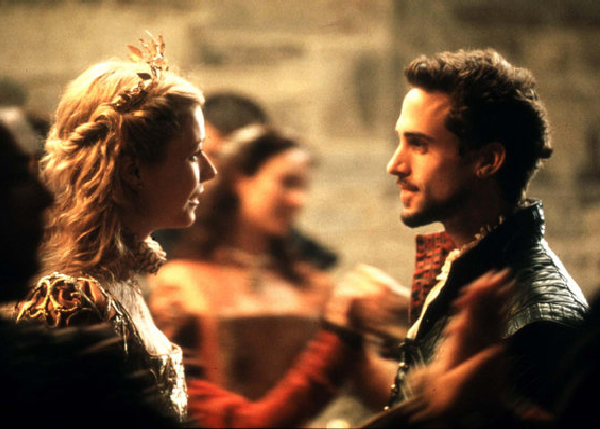The Best Picture Winners: Shakespeare in Love (1998)
Oscar’s 90th birthday is just 34 days away and to celebrate, every other day from now through March 4th, I will be taking a look at each and every film selected for his top award – the good, the bad and the sometimes not-so deserving.

One merciful truth about the Oscar is that no one can actually buy one. If it was possible, then you could imagine that some individuals would have monopolized it. You can, however, monopolize the Oscar campaign; throw buckets of money at private screenings and gala parties that will put your movie in front of the voters. The practice is not new and, in some cases, it has worked.
Enter: Shakespeare in Love, a witty and beautifully-made period comedy that was as smart as a whip, as light as a feather, and as sunny as a spring day. Its chief competition at the 71st Annual Academy Awards was Steven Spielberg’s Saving Private Ryan, a brutal realization of Robert Rodat’s book. Now, weighing these two films amid the traditional values of the Oscar voters, one might have imagined – and rightfully predicted – that Spielberg’s film would take home the year’s top prize. But no, Miramax’s then-CEO Harvey Weinstein (at a time when winning an Oscar was his only concern) dumped millions of dollars into campaigning for Shakespeare in Love to win Best Picture. And it worked. The tide shifted, and Saving Private Ryan was left as the runner up.
I would complain if the movie weren’t so darned irresistible. In a surprisingly good year for movie comedy that included the likes of Waking Ned Divine, Pleasantville, Living Out Loud, Zero Effect, Primary Colors, Antz, The Big Lebowski and There’s Something About Mary, it was nice that the year would end with the smartest and arguably the funniest of the bunch.
Written by Marc Norman and playwright Tom Stoppard, Shakespeare in Love imagines the pains and trials of young Will (played by the mysteriously unnominated Joseph Fiennes) as he battles his faltering production of Romeo and Ethel the Pirate’s Daughter (title pending) and, at the same time, his untamable love for the beautiful Viola de Lessups (Best Actress winner Gwyneth Paltrow) who is already promised to the odious Lord Wessex (Colin Firth) – the inevitability of the arrangement does not stack in Will and Viola’s favor.
What makes the movie work are its observations about a life in the theater in the 16th century as Norman and Stoppard brilliantly parallel Shakespeare’s struggles with life in modern-day Hollywood. Will is a celebrity, yes, but he’s also prone to visiting his shrink; dealing with fussy, immobile financial backers; and fending off wayward fans that just happen to have a script that he might want to read.
But at the same time, we also see how life imitates art, as the melancholy of his future with Viola becomes the catalyst for “Romeo and Juliet.” As the situation worsens and his heart races toward the inevitability of losing his true love, the tragedy of the play begins to build. It is a simple construct but it works in a very beautiful way. In that way, this is a very funny movie, a very smart movie, and a very touching movie at the same time.
So here is where I am at odds. Between Shakespeare in Love and Saving Private Ryan, which is the more deserving? Common thinking would dictate that Spielberg’s film should have been the winner, but juggling this issue is one of the great conundrums of The Academy Awards. Would Shakespeare in Love have won the Oscar without the studio throwing millions of dollars into its campaign? Surely not. Was it fair? Not at all. Did it deserve the Oscar? Yes, and so did Saving Private Ryan. I’m at odds over how Shakespeare arrived at the top. I’m glad it got there, it deserves to be. I guess its an issue that I could continue to bat back and forth for years. This is a puzzle.









